_____ Percent of Adults Under 65 Are Providing Some Care for Family Over 65.
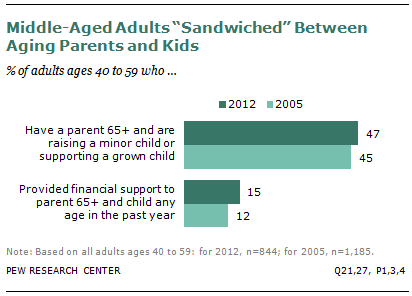 With an aging population and a generation of young adults struggling to achieve fiscal independence, the burdens and responsibilities of eye-aged Americans are increasing. Nearly half (47%) of adults in their 40s and 50s take a parent age 65 or older and are either raising a young child or financially supporting a grown child (age eighteen or older). And near one-in-seven center-aged adults (fifteen%) is providing financial support to both an aging parent and a child.
With an aging population and a generation of young adults struggling to achieve fiscal independence, the burdens and responsibilities of eye-aged Americans are increasing. Nearly half (47%) of adults in their 40s and 50s take a parent age 65 or older and are either raising a young child or financially supporting a grown child (age eighteen or older). And near one-in-seven center-aged adults (fifteen%) is providing financial support to both an aging parent and a child.
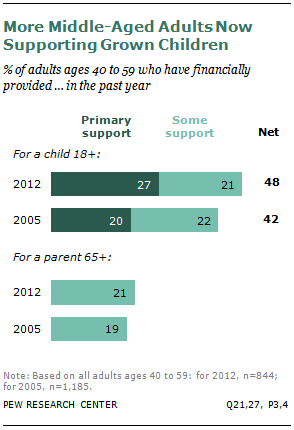 While the share of eye-anile adults living in the so-called sandwich generation has increased only marginally in contempo years, the financial burdens associated with caring for multiple generations of family members are mounting. The increased force per unit area is coming primarily from grown children rather than aging parents.
While the share of eye-anile adults living in the so-called sandwich generation has increased only marginally in contempo years, the financial burdens associated with caring for multiple generations of family members are mounting. The increased force per unit area is coming primarily from grown children rather than aging parents.
According to a new nationwide Pew Inquiry Center survey, roughly half (48%) of adults ages 40 to 59 have provided some financial support to at least ane grown child in the past year, with 27% providing the primary support. These shares are up significantly from 2005. By contrast, about one-in-five middle-aged adults (21%) have provided financial support to a parent historic period 65 or older in the past year, basically unchanged from 2005. The new survey was conducted Nov. 28-Dec. 5, 2012 among 2,511 adults nationwide.
Looking merely at adults in their 40s and 50s who take at to the lowest degree ane child age 18 or older, fully 73% have provided at least some financial help in the past year to at to the lowest degree 1 such child. Many are supporting children who are all the same in schoolhouse, but a significant share say they are doing and so for other reasons. By dissimilarity, among adults that age who have a parent historic period 65 or older, simply 32% provided financial assist to a parent in the past year.
While middle-aged adults are devoting more resource to their grown children these days, the survey finds that the public places more value on back up for aging parents than on back up for grown children. Amongst all adults, 75% say adults take a responsibility to provide fiscal assistance to an elderly parent who is in demand; only 52% say parents have a like responsibility to support a grown child.
One likely explanation for the increase in the prevalence of parents providing financial assistance to grown children is that the Cracking Recession and sluggish recovery have taken a disproportionate cost on young adults. In 2010, the share of immature adults who were employed was the lowest it had been since the authorities started collecting these data in 1948. Moreover, from 2007 to 2011 those immature adults who were employed total time experienced a greater drop in average weekly earnings than any other historic period group.1
A Profile of the Sandwich Generation
Adults who are office of the sandwich generation—that is, those who have a living parent historic period 65 or older and are either raising a kid under age xviii or supporting a grown child—are pulled in many directions.2 Non only do many provide care and fiscal support to their parents and their children, merely well-nigh four-in-10 (38%) say both their grown children and their parents rely on them for emotional support.
Who is the sandwich generation? Its members are mostly middle-anile: 71% of this group is ages forty to 59. An boosted 19% are younger than 40 and ten% are historic period 60 or older. Men and women are equally likely to be members of the sandwich generation. Hispanics are more likely than whites or blacks to be in this state of affairs. 3-in-ten Hispanic adults (31%) have a parent age 65 or older and a dependent child. This compares with 24% of whites and 21% of blacks.
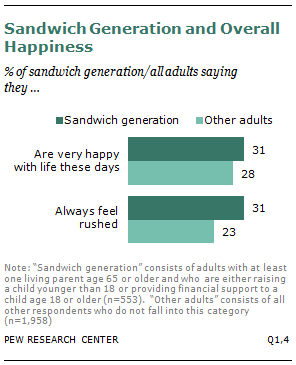 More affluent adults, those with almanac household incomes of $100,000 or more than, are more probable than less flush adults to exist in the sandwich generation. Among those with incomes of $100,000 or more than, 43% have a living parent age 65 or older and a dependent kid. This compares with 25% of those making between $30,000 and $100,000 a year and only 17% of those making less than $30,000.
More affluent adults, those with almanac household incomes of $100,000 or more than, are more probable than less flush adults to exist in the sandwich generation. Among those with incomes of $100,000 or more than, 43% have a living parent age 65 or older and a dependent kid. This compares with 25% of those making between $30,000 and $100,000 a year and only 17% of those making less than $30,000.
Married adults are more than likely than unmarried adults to be sandwiched between their parents and their children: 36% of those who are married autumn into the sandwich generation, compared with 13% of those who are unmarried. Age is a factor here likewise, since immature adults are both less probable to be married and less likely to have a parent age 65 or older.
Presumably life in the sandwich generation could exist a fleck stressful. Having an aging parent while still raising or supporting one's own children presents sure challenges not faced by other adults—caregiving and financial and emotional back up to proper noun just a few. However, the survey suggests that adults in the sandwich generation are merely equally happy with their lives overall equally are other adults. Some 31% say they are very happy with their lives, and an additional 52% say they are pretty happy. Happiness rates are nearly the same among adults who are not part of the sandwich generation: 28% are very happy, and 51% are pretty happy.
Sandwich-generation adults are somewhat more probable than other adults to say they are often pressed for time. Among those with a parent age 65 or older and a dependent child, 31% say they always feel rushed even to do the things they have to do. Among other adults, the share saying they are always rushed is smaller (23%).
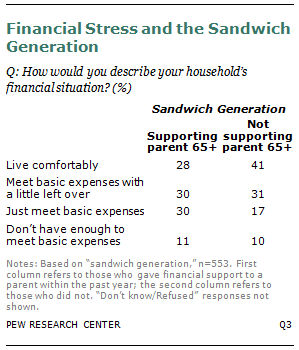 For members of the sandwich generation who not just have an crumbling parent but have also provided financial assistance to a parent, the strain of supporting multiple family unit members can have an bear on on financial well-beingness.iii Survey respondents were asked to describe their household's fiscal situation. Amongst those who are providing financial support to an crumbling parent and supporting a child of whatever age, 28% say they live comfortably, thirty% say they have plenty to see their basic expenses with a little left over for extras, thirty% say they are just able to see their basic expenses and xi% say they don't have enough to run across even basic expenses. By contrast, 41% of adults who are sandwiched between children and aging parents, but not providing fiscal support to an aging parent, say they live comfortably.
For members of the sandwich generation who not just have an crumbling parent but have also provided financial assistance to a parent, the strain of supporting multiple family unit members can have an bear on on financial well-beingness.iii Survey respondents were asked to describe their household's fiscal situation. Amongst those who are providing financial support to an crumbling parent and supporting a child of whatever age, 28% say they live comfortably, thirty% say they have plenty to see their basic expenses with a little left over for extras, thirty% say they are just able to see their basic expenses and xi% say they don't have enough to run across even basic expenses. By contrast, 41% of adults who are sandwiched between children and aging parents, but not providing fiscal support to an aging parent, say they live comfortably.
Family Responsibilities
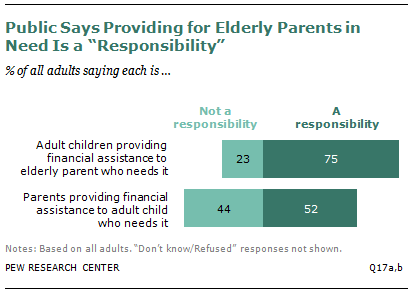 When survey respondents were asked if developed children have a responsibility to provide fiscal assist to an elderly parent in need, fully 75% say aye, they do. Merely 23% say this is not an adult child'due south responsibleness. By dissimilarity, only about half of all respondents (52%) say parents have a responsibility to provide financial assistance to a grown kid if he or she needs it. Some 44% say parents do non have a responsibility to do this.
When survey respondents were asked if developed children have a responsibility to provide fiscal assist to an elderly parent in need, fully 75% say aye, they do. Merely 23% say this is not an adult child'due south responsibleness. By dissimilarity, only about half of all respondents (52%) say parents have a responsibility to provide financial assistance to a grown kid if he or she needs it. Some 44% say parents do non have a responsibility to do this.
When it comes to providing financial back up to an aging parent in need, there is strong support across most major demographic groups. Still, at that place are significant differences across age groups. Adults under age 40 are the most likely to say an adult kid has a responsibility to support an elderly parent in need. Eight-in-ten in this historic period group (81%) say this is a responsibility, compared with 75% of middle-aged adults and 68% of those ages 60 or older. Adults who are already providing financial back up to an crumbling parent are no more likely than those who are not currently doing this to say this is responsibleness.
On the question of whether parents have a responsibility to back up their grown children, personal experience does seem to affair. Parents whose children are younger than eighteen are less likely than those who have a kid age eighteen or older to say that it is a parent'south responsibility to provide financial support to a grown child who needs it (46% vs. 56%). And those parents who are providing primary financial support to a grown child are among the virtually likely to say this is a parent'southward responsibleness (64%).
Financial Back up for Aging Parents and Grown Children
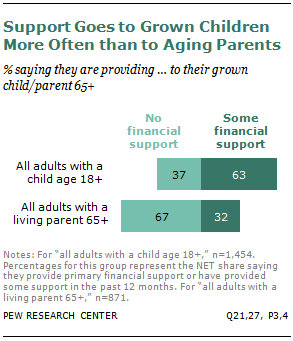 While most adults believe in that location is a responsibility to provide for an elderly parent in financial demand, virtually one-in-four adults (23%) have really washed this in the past year. Amongst those who have at least ane living parent age 65 or older, roughly 1-tertiary (32%) say they have given their parent or parents financial support in the past year. And for nearly, this is more than just a short-term commitment. About vii-in-ten (72%) of those who have given fiscal assistance to an aging parent say the money was for ongoing expenses.
While most adults believe in that location is a responsibility to provide for an elderly parent in financial demand, virtually one-in-four adults (23%) have really washed this in the past year. Amongst those who have at least ane living parent age 65 or older, roughly 1-tertiary (32%) say they have given their parent or parents financial support in the past year. And for nearly, this is more than just a short-term commitment. About vii-in-ten (72%) of those who have given fiscal assistance to an aging parent say the money was for ongoing expenses.
Like shares of eye-aged, younger and older adults say they have provided some fiscal support to their aging parents in the past year. It is worth noting that many parents age 65 or older may non be in demand of financial assistance, so there is not necessarily a disconnect between the share proverb developed children take a responsibility to provide for an aging parent who is in demand and the share who have provided this type of back up.
Overall, Americans are more likely to be providing financial support to a grown kid than they are to an crumbling parent. Among all adults, 30% say they take given some blazon of financial support to a grown child in the past year. Among those who have a grown child, more six-in-ten (63%) have done this.
Hither the burden falls much more than heavily on adults who are middle-aged than on their younger or older counterparts. Among adults ages 40 to 59 with at least one grown kid, 73% say they take provided financial back up in the past year. Amongst those ages lx and older with a grown kid, only about half (49%) say they take given that child financial back up. Very few of those nether age xl accept a grown child.
Of those heart-aged parents who are providing financial help to a grown kid, more half say they are providing the master support, while nearly four-in-10 (43%) say they are not providing principal back up simply take given some financial support in the by 12 months. Some 62% of the parents providing primary back up say they are doing so considering their child is enrolled in school. Still, more than one third (36%) say they are doing this for some other reason.
The focus in this report is on the financial flows from middle-aged adults to their aging parents and their grown children. Of class, money also flows from parents who are 65 or older to their middle-aged children. While the new Pew Research survey did not explore these fiscal transfers, previous surveys have constitute that a pregnant share of older adults provide financial help to their grown children. A Pew Research survey conducted in Sept. 2011 found that among adults 65 and older with at least i grown child age 25 or older, 44% said they had given financial support to a grown child in the past yr.four
Beyond Finances: Providing Care and Emotional Support
While some aging parents need financial support, others may likewise demand assist with day-to-day living. Among all adults with at least one parent age 65 or older, 30% say their parent or parents need assistance to handle their affairs or treat themselves; 69% say their parents tin can handle this on their own.
Heart-aged adults are the most likely to have a parent historic period 65 or older (68% say they do). And of that group, 28% say their parent needs some assistance. Amidst those younger than 40, only 18% accept a parent age 65 or older; twenty% of those ages 60 and older have a parent in that age grouping. But for those in their 60s and beyond who do nevertheless have a living parent, the likelihood that the parent will demand caregiving is relatively high. Fully one-half of adults age 60 or older with a living parent say the parent needs help with day-to-day living.
When crumbling adults need assistance handling their affairs or caring for themselves, family members oft help out. Among those with a parent historic period 65 or older who needs this type of aid, 31% say they provide well-nigh of this help, and an additional 48% say they provide at to the lowest degree some of the aid.
In addition to helping their aging parents with day-to-day living, many adults report that their parents rely on them for emotional back up. Amidst all adults with a living parent age 65 or older, 35% say that their parent or parents oftentimes rely on them for emotional support, and 33% say their parents sometimes rely on them for emotional support. One-in-five say their parents inappreciably e'er rely on them in this way, and 10% say they never do.
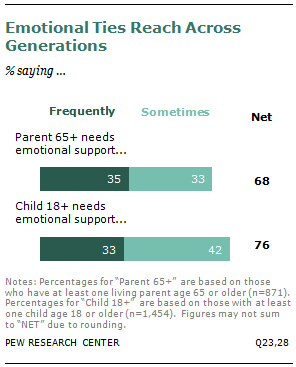 Fifty-fifty among those who say their parents do not need help handling their affairs or caring for themselves, 61% say their parents rely on them for emotional support at least sometimes. For those whose parents practice need assist with daily living, fully 84% report that their parents rely on them for emotional back up at least some of the fourth dimension.
Fifty-fifty among those who say their parents do not need help handling their affairs or caring for themselves, 61% say their parents rely on them for emotional support at least sometimes. For those whose parents practice need assist with daily living, fully 84% report that their parents rely on them for emotional back up at least some of the fourth dimension.
Not surprisingly, the older the parent, the more likely he or she is to require emotional back up. Among adults with a parent historic period fourscore or older, 75% say their parents plow to them for emotional support frequently or sometimes. This compares with 64% among those who take a parent ages 65 to 79.
Emotional support as well flows from parents to grown children, even children who are financially independent. Overall, 33% of parents with at least one child age 18 or older say their grown kid or children depend on them frequently for emotional back up. An additional 42% say their grown children sometimes rely on them for emotional support.
When information technology comes to grown children, in that location is a link between fiscal and emotional back up. Amidst parents who say they are providing primary financial support to their grown kid or children, 43% say their children frequently rely on them for emotional support and 45% say they sometimes exercise. By comparing, just 24% of those who say they practise not provide whatsoever financial support to their grown children say their children oft rely on them for emotional back up, and 39% say their children sometimes rely on them for this type of support.
Boomers Moving Out of the Sandwich Generation
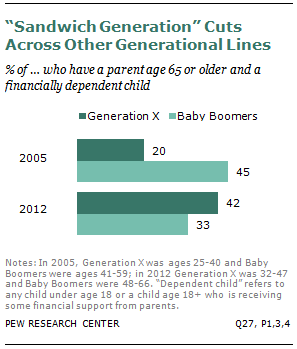 Today members of the Baby Boomer generation and Generation X are represented in the "sandwich generation." But the residual has shifted significantly. When the Pew Research Eye explored this topic in 2005, Baby Boomers made upwards the bulk of the sandwich generation. They were more than twice as likely every bit members of the side by side generation—Generation X—to have a parent age 65 or older and be supporting a kid (45% vs. 20%). Since 2005, many Baby Boomers accept aged out of the sandwich generation, and today adults who are part of Generation X are more likely than Baby Boomers to find themselves in this situation: 42% of Gen Xers have parent age 65 or older and a dependent kid, compared with 33% of Boomers.5
Today members of the Baby Boomer generation and Generation X are represented in the "sandwich generation." But the residual has shifted significantly. When the Pew Research Eye explored this topic in 2005, Baby Boomers made upwards the bulk of the sandwich generation. They were more than twice as likely every bit members of the side by side generation—Generation X—to have a parent age 65 or older and be supporting a kid (45% vs. 20%). Since 2005, many Baby Boomers accept aged out of the sandwich generation, and today adults who are part of Generation X are more likely than Baby Boomers to find themselves in this situation: 42% of Gen Xers have parent age 65 or older and a dependent kid, compared with 33% of Boomers.5
This study volition focus largely on adults ages xl to 59, loosely defined every bit "centre aged." While this group may not share a generational label, many of its members do have a shared set up of experiences, challenges and responsibilities given the unique position they inhabit, sandwiched betwixt their children and their aging parents.
Middle-aged adults who make up the core of the sandwich generation are living out these challenges and, in the procedure, perchance ushering in a new set of family dynamics. Near eye-aged parents with grown children say their relationship with their children is different from the human relationship they had with their own parents at a comparable age. One-half say the relationship is closer, while 12% say it'due south less close and 37% say the human relationship is about the same. Older adults (those ages lx and older) are less probable than middle-anile parents to say they have a closer human relationship with their grown children than they had with their own parents (44%), and they are more likely to say the human relationship is about the same (45%).
The balance of this report will wait at the bones building blocks of intergenerational relationships in more item. The first section will look at attitudes virtually financial responsibilities and the reality of fiscal transfers. The second section will wait at caregiving for older adults. How many older adults demand assistance with day-to-twenty-four hours living, and who is providing that care? The tertiary section will look at emotional ties beyond generations and explore the extent to which crumbling parents rely on their children and grown children rely on their parents for emotional support.
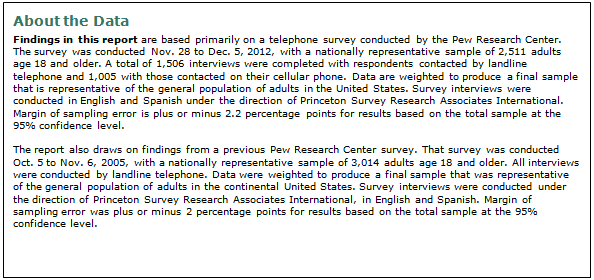
Source: https://www.pewresearch.org/social-trends/2013/01/30/the-sandwich-generation/
0 Response to "_____ Percent of Adults Under 65 Are Providing Some Care for Family Over 65."
Post a Comment